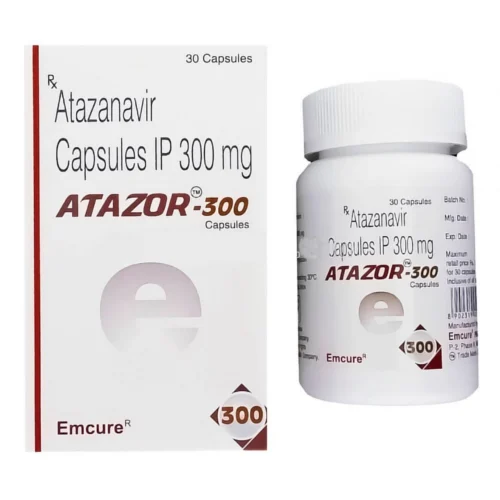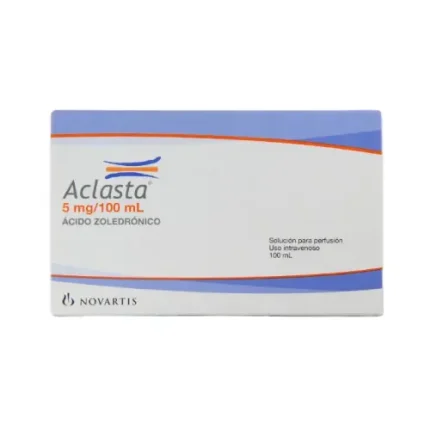Introduction to Atazor 300mg Capsule
Atazor 300mg Tablet is an antiretroviral medication containing the active ingredient Atazanavir. It is used in combination with other antiretroviral drugs to treat HIV-1 infection. HIV-1 targets and destroys immune system cells, and if left untreated, it weakens the body’s ability to fight diseases, eventually leading to death. It’s important to note that lactose is present in this medication, so if you have lactose intolerance, inform your doctor.
Prior to consuming Atazor 300mg Tablet, consult your doctor if you have liver, kidney, or stomach pain, blood disorders, allergic reactions, or any other medical conditions, including HIV. Atazor 300mg Tablet, along with other antiretroviral drugs, aids in replenishing and sustaining CD4 cell counts, thus reinforcing the immune system’s ability to combat infections. CD4 cells, also recognized as T-helper cells, are a vital component of the immune system that is specifically targeted and diminished by HIV. It is imperative not to share personal items such as razors or toothbrushes with anyone.
Uses of Atazor 300mg Capsule
- Atazor 300mg Tablet is used to treat HIV -1 Infection.
Therapeutic Effects of Atazor 300mg Capsule
The efficacy of Atazor 300mg Tablet stems from its capacity to inhibit the replication of HIV. Acting as a protease inhibitor, it impedes the activity of the HIV protease enzyme, thereby halting the production of mature and infectious viral particles.
By diminishing the viral load and slowing the progression of HIV infection, this antiviral medication aids in preserving immune function, boosting CD4 cell counts, and lowering the risk of opportunistic infections. Such therapeutic effects enable individuals with HIV to sustain a healthier immune system and enhance their long-term prognosis.
Interaction of Atazor 300mg Capsule with other drugs
Make sure to inform your healthcare provider about all medications you are currently taking, including prescription drugs, over-the-counter medications, nutritional or vitamin supplements, and herbal products. Certain medications may interact with Atazor 300mg Tablet, potentially reducing its effectiveness and causing undesirable side effects.
More Information about Atazor 300mg Capsule
- Store at temprature between 20-25°C (68-77°F).
- Keep away from moisture, heat, and light.
- It should not be frozen.
- Keep it in the original packaging.
- Keep it away from children and pets.
How to consume Atazor 300mg Capsule
Atazor 300mg Tablet Tablet is taken orally. The medication is taken once a day, either with or can be taken without food, as directed by your healthcare provider. Swallow the capsule or tablet whole without crushing or chewing it.
Safety Advices for Atazor 300mg Capsule

Pregnancy
Pregnant women should consult a doctor before taking Atazor 300mg Tablet.

Breast Feeding
Atazor 300mg Tablet is excreted into breast milk. So it is unsafe to use in breastfeeding.

Liver
Atazor 300mg Tablet can potentially cause or worsen liver toxicity and may adversely affect liver function.

Alcohol
Alcohol can interact with Atazor 300mg Tablet in various ways, including increasing the risk of side effects, decreasing the effectiveness of the medication, or causing other harmful interactions.

Driving
Patients should always monitor their response to the Atazor 300mg Tablet medication and be cautious when driving or operating machinery if they experience any side effects that may impair their ability to do so safely.
Side Effects of Atazor 300mg Capsule
Atazor 300mg Tablet causes side effects like all medications, although not everyone will experience them.
Serious
- Severe skin reactions (Stevens-Johnson syndrome or toxic epidermal necrolysis)
- Severe liver problems
- Pancreatitis (inflammation of the pancreas)
- Immune reconstitution syndrome (a condition where the immune system becomes overactive after starting HIV treatment)
Common
- Fatigue
- Headache
- Nausea
- Insomnia (difficulty sleeping)
- Diarrhea
- Rash
- Abdominal pain or discomfort
- Elevated liver enzymes (as detected by blood tests)
Word of Advice
Prioritizing safety is paramount when contemplating the use of Atazor 300mg Tablet or any other medication. Avoid its use during breastfeeding to safeguard the developing fetus. Exercise caution in individuals with existing heart conditions or those taking medications that prolong the QT interval. Regular monitoring of blood sugar levels is crucial for individuals with diabetes. By adhering to these precautions and promptly seeking medical attention for any concerning symptoms, individuals can ensure the safe and effective use of this medication and optimize their overall treatment experience.
FAQs
Q 1. Can Atazor 300mg Tablet cause changes in body fat distribution?
Yes, Atazor 300mg Tablet, like other HIV medications, can potentially cause changes in body fat distribution. This may include increased fat in the abdomen, breasts, and back of the neck, while the face, arms, and legs may experience fat loss. It is known as lipodystrophy.
Q 2. Is it safe to take Atazor 300mg Tablet with antacids or acid-reducing medications?
Atazor 300mg Tablet should not be taken at the same time as antacids or acid-reducing medications, as they can interfere with the absorption of this medication. It is recommended to separate the doses by a few hours.
Q 3. Can Atazor 300mg Tablet affect hormonal contraceptive effectiveness?
Atazor 300mg Tablet may interact with hormonal contraceptives, such as birth control pills, reducing their effectiveness. Additional or alternative contraceptive methods, such as barrier methods, should be used while taking it. Consult with a healthcare provider for appropriate contraceptive recommendations.
Fact Box of Atazor 300mg Capsule
Molecule name: Atazanavir
Pharmacological class: Protease inhibitors.
Therapeutic class: Anti-viral
Indications: HIV - 1 infection

 MEDICINES
MEDICINES PATIENT ASSISTANCE PROGRAMS
PATIENT ASSISTANCE PROGRAMS IMPORTED MEDICINES
IMPORTED MEDICINES CONTACT US
CONTACT US Upload
Upload












Reviews
There are no reviews yet.